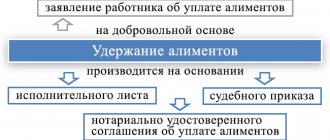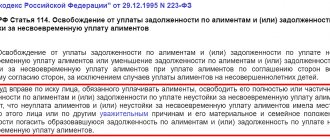When and by whom is alimony paid for a disabled person?
According to the family legislation of the Russian Federation, the obligation to pay alimony for the maintenance of a disabled child rests with the parents (Article 85 of the RF IC). If the father or mother refuses to voluntarily help financially and provide for the needs of the offspring, then collection is carried out forcibly, through a court decision.
Also, receiving alimony for the maintenance of a disabled person from their able-bodied relatives and family members is provided for the following categories of citizens:
a disabled former spouse (if the loss of ability to work occurred during marriage or within a year after the termination of official relations) (Article 90 of the RF IC);- the mother of an incapacitated child, caring for a child up to 18 years of age and in certain cases after adulthood (in case of disability from childhood of group I) (Article 90 of the RF IC);
- incompetent parents from their own children who have reached the age of majority (Article 87 of the RF IC).
In accordance with the chapters of the RF IC, disabled and financially needy citizens have the right to rely on alimony payments. Accordingly, alimony for the maintenance of a disabled person is included in the presented list.
Attention
It is worth making a reservation about disability group III - with it a person can work, but with some restrictions. But even despite the opportunity to work, a citizen is still considered disabled and in need of additional social protection (Federal Law No. 166 of December 15, 2001 and Chapter 1 of Federal Law No. 181). Accordingly, the possibility of receiving alimony for the maintenance of a disabled person is provided.
Withholding of alimony
Withdrawal of alimony is made from wages or other payments at the request of the employee or by force.
According to the employee
If the payer works officially, then the accounting department withholds money from the salary at his request.
If the payer does not have regular income, he pays alimony in a fixed amount. The amount is fixed; deduction can also be made by an accountant.
Forcibly
Can only be carried out within the framework of enforcement proceedings. Based on the writ of execution, the accounting department makes deductions from wages.
Methods of paying alimony for the maintenance of a disabled person
There are two options for transferring alimony for the maintenance of a disabled person: child, spouse or parents. Namely:
- voluntary - an agreement is concluded between the interested parties on the payment of alimony for the maintenance of an incapacitated citizen and certified by a notary;
- forcibly - the initiating party submits an application to the court with a demand to recover alimony from the spouse (son, daughter), if it was not possible to reach an agreement peacefully.
If in the first case the parties can independently choose for themselves a convenient form and frequency of mutual settlements of alimony payments for the maintenance of a disabled person (clause 1 of Article 104 of the RF IC), then in the second option it is possible for the court to assign monthly payments in shares of the salary of the alimony obligee, a fixed monetary amount amount or in a mixed way (clause 2 of article 104 of the RF IC).
Non-payment of alimony
Refusal to pay implies liability. If mom or dad shirk financial obligations, debt develops.
Debt
Debt is a sum of money that arises due to non-payment of alimony.
The obligation to pay is fixed in the writ of execution, settlement agreement, or court order. It does not matter how alimony was set for payment: as a percentage of the salary, or in a fixed amount. If the money is not paid on time, a debt is formed. It can be intentional, or it can be formed without the fault of the debtor. This is where responsibility comes from.
The amount of alimony payments depending on the status of the incapacitated person
The amount of alimony payments for the maintenance of a disabled person varies depending on the status of the recipient and the degree of need. When making a determination regarding the amount of payments in court, the financial situation of the incapacitated citizen is taken into account.
IMPORTANT
If the judicial authority assigns alimony in a fixed amount, then the minimum subsistence level in a given region or the indicator established at the federal level is taken as a basis (Article 117 of the RF IC).
The amount of alimony for the maintenance of disabled people, depending on the status:
| Category | Disability group | Amount of alimony payments | Legislative justification | Payment procedure |
| Disabled minor child | 1,2,3 |
| Art. 83, -, , 93-97 RF IC |
|
| Adult disabled child | Disabled since childhood, group I | The court assigns a fixed amount for the maintenance of a disabled person unless otherwise specified in the agreement. | Art. RF IC | On an ongoing basis. |
| Parent caring for a disabled child | Disability from birth. | By agreement or in hard ruble equivalent established in court. | Art. RF IC | Until the child reaches adulthood. |
| Disabled spouse | I, II, III | In shares of the defendant’s salary or a fixed amount. | Art. — RF IC | For life or until the alimony recipient’s ability to work is restored. |
| Parents on disability | I, II, III | It is determined by the court in a specific amount, based on the financial capabilities of the alimony obligee to provide alimony to a disabled person. | Art. RF IC | Until the death of the alimony recipient. |
Grounds for termination of alimony obligations
Termination of alimony obligations is regulated at the legislative level. This issue is discussed in paragraph 1 of Article 120 of the RF IC. In accordance with this legislative standard, alimony relationships can be terminated under the following circumstances:
- If one of the parties to the alimony agreement suddenly died;
- If the contract has expired and the parties do not intend to renew it in the future;
- When children reach 18 years of age. In some situations, child support obligations may be extended until the child receives higher education;
As a result of the occurrence of other conditions that are provided for in accordance with the provisions of alimony agreements. For example, this could be the restoration of the alimony recipient’s ability to work, or the improvement of the recipient’s financial circumstances, as a result of which he will not need financial assistance from the payer.
As for the grounds for termination of alimony obligations, which are collected by decision of the courts, they are listed in paragraph 2 of Article 120 of the RF IC. In accordance with them, the payment of child support benefits ceases when the child reaches the age of majority. However, in some situations, payments may be extended if compelling circumstances exist.
In addition, termination of child support obligations may occur in cases where a child who has reached the age of 16 receives full legal capacity as a result of emancipation, or in accordance with a court decision.
Voluntary order
Financial support for relatives can be paid on the basis of an agreement concluded by the parties in writing and certified by a notary. The document has the force of a writ of execution. If one of the parties ignores its terms, then the second has the right to transfer the agreement for forced collection. In most cases, the agreement provides for a fixed amount of payment.
Reasons for termination of obligations paid by agreement of the parties:
- death of one of the parties;
- expiration date;
- in accordance with the terms of the agreement.
The agreement may include terms under which the agreement is terminated. The law does not limit the will of the parties. Therefore, they are free to include any options. For example, an adult son must pay financial support to his father until the birth of the child.
Judicial order
Financial support for a relative may be collected by court decision. If the parties cannot reach an agreement on their own, then the disabled, minor relative or his representative have the right to forcibly recover financial assistance.
To collect funds, it is necessary to determine the jurisdiction:
- through the magistrate's court;
- through a city or district court.
Financial support is collected by order if the only controversial issue between the parties is monetary support. The applicant does not pay the state fee.
Claim proceedings are used by persons resolving several controversial issues at the same time. The statement of claim may contain demands for the collection of alimony, determination of the place of residence of a minor child, divorce, division of the common property of the spouses, and establishment of paternity.
An executive document (court order or writ of execution) obtained as a result of court proceedings may be submitted for enforcement.
The grounds for terminating the obligation to pay monetary support for relatives apply regardless of whether the document has been submitted for forced collection or not. But if he is in the FSSP, then the alimony payer must apply to the court to obtain a court decision. The court decision is transferred to the SSP to stop the collection. Payment arrears will remain. The exception is the death of the parties.
Normative base
Issues regarding alimony obligations for the maintenance of a disabled person are regulated in the Russian Federation at the legislative level. Fundamental laws and regulations are presented in the table:
| Regulations | Procedural documents responsible for the implementation of approved norms |
|
|
The procedure for registering alimony for the maintenance of a disabled person on a voluntary basis
When concluding a voluntary agreement regarding alimony for the maintenance of a disabled person, guided by the norms of paragraph 1 of Article 101 of the RF IC, the rules legally enshrined in the chapter of the Civil Code of the Russian Federation are applied. The initiators of concluding an agreement to pay funds to those in need can be not only parents, but also children.
The procedure for drawing up an agreement on alimony payments for the maintenance of a disabled person will be as follows:
- One of the parties (those in financial need) sends the other an offer to enter into a voluntary agreement to provide financial support.
- If the recipient (a relative of the person in need) is not averse to voluntarily helping financially, then they agree on the time and date when negotiations should take place.
- When the parties meet, they mutually agree on all the conditions for the payment of alimony for the maintenance of a disabled person (amount, method and procedure for calculation, indexation of payments) and write down the agreements on paper.
- When the parties agree on all issues, they sign the document.
- Then the agreement (in triplicate) is certified by a notary, only then the document will enter into legal force (Article 100 of the RF IC).
For your information,
a voluntary agreement on alimony for the maintenance of a disabled person has the same legal weight as a writ of execution (Article 100 of the RF IC). A written agreement can be sent to the accounting department where the payer works (Article 109 of the RF IC). And if the person obligated for alimony refuses to fulfill the obligations specified in the agreement, then the recipient of the material payments can submit the agreement to the bailiff and the funds in this case will be forcibly collected.
The list of documents required when drawing up an agreement for alimony payments for the maintenance of a disabled person is almost standard for all cases:
- Russian passports;
- birth certificates for children (for payments for minor citizens);
- marriage certificate;
- a certificate from the defendant’s work indicating the amount of earnings;
The law does not provide for a standard form for drawing up an agreement on alimony to provide for a disabled person, but there are recommendations on the content of the document. The contract must contain the following information:
- initials of the parties to the transaction, their residential addresses and telephone numbers for contact;
- Full name of the disabled person for whose maintenance monetary contributions will be made;
- the age of the child (when this means child support for children with disabilities - adults or not);
- the amount due monthly and how it will be paid;
- from what date will transfers of funds begin;
- liability for evading the obligation to provide financial support to a needy plaintiff;
- the period of validity of the agreement on alimony to provide for a disabled person;
- signatures of both parties.
IMPORTANT
In accordance with Art. 99 of the RF IC, if one of the parties to the transaction is declared incompetent in court (Article 29 of the Civil Code of the Russian Federation), the agreement on the transfer of alimony to provide for a disabled person has the legal right to be signed by a guardian or other legal person acting for the interests of the alimony recipient. Otherwise, such an act is considered void (Article 171 of the Civil Code of the Russian Federation). When concluding agreements on paper with a person who is partially capable, the consent of the trustee is required (Article 176 of the Civil Code of the Russian Federation).
If the parties unanimously decided to change some of the conditions specified in the agreement on alimony for the maintenance of a person with a disability, or are ready to completely terminate the agreement, then this can be done at any time. Only the procedure for amending or canceling a voluntary agreement on cash payments must take place in the same sequence as when drawing up a document and in writing (clause 2 of Article 101 of the RF IC).
When one of the parties to the transaction opposes changes to the agreement, then it is impossible to make amendments or terminate the contract for alimony to provide for a disabled person (clause 3 of Article 101 of the RF IC). In this case, the interested person has the right to go to court to resolve the dispute (Clause 4 of Article 101 of the RF IC). Only in advance, you must receive from the party who disagrees to change the terms of the agreement a written refusal (Article 452 of the Civil Code of the Russian Federation).
A sample agreement on alimony for the maintenance of disabled parents is available.
What changes to legislation were made in 2018?
The need to amend the legislation related to the regulation of alimony payments has been long overdue. This is due to the imperfection of family law norms aimed at collecting funds in favor of children and persons in dire need of material support.
Recent changes have affected the issue of indexation of payments. This measure is especially relevant for recipients of alimony in TDS. In this case, the applicant does not have to apply to the court in order to increase payments. The operation will be carried out automatically by the competent authorities.
The new 2020 law also involves improving the procedure for receiving funds by the responsible person in terms of recognizing a missing parent who has been charged with paying child support. The rule applies when the search for the debtor is unsuccessful. In this case, the funds are reimbursed in the form of a survivor's pension. The measure allows you to protect the rights and interests of a minor by ensuring his material needs.
Documents for registration of alimony for a disabled person through the court
If the parties were unable to resolve the issue of alimony for the maintenance of a relative with a disability, then the only way out is for the financially needy person to appeal to the court with a corresponding statement, written manually and based on the requirements of Art. 131 Code of Civil Procedure of the Russian Federation. The following package of documents is attached to the petition (the list is approved in Article 132 of the Code of Civil Procedure of the Russian Federation):
Required documents:
- indicating the right to a benefit or exemption from the obligation to pay money;
- power of attorney (if another person acts on behalf of the plaintiff);
- documentary evidence of pre-trial measures taken to resolve a dispute regarding the payment of alimony for the maintenance of a disabled person;
- documents confirming the circumstances referred to by the applicant when putting forward his demands;
- calculation of the collected alimony for the maintenance of a disabled person with the signature of the plaintiff or his authorized representative (in triplicate);
- a statement written by hand and in accordance with the requirements of Art. 131 Code of Civil Procedure of the Russian Federation;
- plaintiff's passport.
If a claim is being prepared to collect alimony for the maintenance of a disabled minor child, you will need:
- a document for the child certifying the fact of his birth (the defendant must be entered as the father);
- certificate of annulment of marriage;
- certificate of income of the person obligated to pay alimony;
- an extract about the composition of the family where the child lives;
- certificate of disability;
- receipts and checks serving as confirmation of expenses for the child.
All documents must be submitted to the court in xeroxed form.
The plaintiff filing an application for the recovery of alimony for the maintenance of a disabled person does not pay the state duty (part 1, paragraph 2, 17, 15 of article 333.36 of the Tax Code of the Russian Federation).
A sample application for support for a spouse living with a disabled child is available.
Arbitrage practice
Citizen S. filed a claim with the Leninsky District Court of Krasnodar to collect alimony for a disabled child in the amount of 1/3 of all types of income, for herself in the amount of 2 minimum wages, and also with a request to provide one-time alimony in the amount of 10 thousand. rub. for treatment of my daughter. The citizen provided the court with medical documents confirming the child’s disability. The court established alimony in the amount of 1/3 of the income, and determined the amount for maintaining the spouse as 1 minimum monthly wage. Request for an additional recovery of 10 thousand rubles. the judge did not support, considering the amount of child support sufficient to meet the needs of the child.
Disabled children are a special category of citizens that require sensitive treatment, increased attention, care, and provision of means to maintain and improve their health. Providing for such children is the direct responsibility of both parents, which remains even in the event of divorce.
The best option is to enter into an agreement on alimony with a set amount of payments. If consensus cannot be reached, the issue will have to be resolved through the courts. If you have any questions about the rules for filing a claim, the filing procedure, or collecting documents, please contact a lawyer at ros-nasledsvo.ru.
FREE CONSULTATIONS are available for you! If you want to solve exactly your problem, then
:
- describe your situation to a lawyer in an online chat;
- write a question in the form below;
- call Moscow and Moscow region
- call St. Petersburg and region
Save or share the link on social networks
- FREE for a lawyer!
Write your question, our lawyer will prepare an answer for FREE and call you back in 5 minutes.
By submitting data you agree to the Consent to PD processing, PD Processing Policy and User Agreement
Useful information on the topic
1
Alimony for maintenance of wife
According to Article 10 of Law 223-FZ, after marriage, spouses take...
2
Child support for parents with adult children
In most families, children traditionally support their parents, take care of...
10
Alimony from a non-working father
Providing a child with everything he needs can be difficult even in a full-fledged family...
3
Collection of alimony in a fixed amount
There are several options for paying alimony, one of which is transfer...
2
Statement of claim for the recovery of alimony penalties
Parents are obligated to support their child. If they get divorced/separated, then he...
2
How to reduce child support debt
Child support must be paid for many years until the child becomes an adult...
The procedure for obtaining alimony through the court
The procedure for approving alimony payments for the maintenance of a disabled person is regulated by Chapter 17 of the RF IC. In order to collect financial assistance to provide for a person with disabilities, you must:
- Collect the required documentary package and attach it to the application, file a lawsuit at the place of registration of yourself or the defendant.
- There is no need to pay state duty.
- In the court office, an application for alimony for the maintenance of a disabled person is registered and a receipt is issued indicating the date of the hearing.
- Both parties appear at the hearing at the appointed time. If the defendant does not come, then the meeting is not canceled, but held without him.
As a result, the judge makes an appropriate decision, which indicates the amount and form of collection of alimony to support a person with a disability. Based on the decision of the government representative, a writ of execution is issued, which is immediately given to the plaintiff for presentation to the bailiff service or to the work of the alimony payer.
Duration and cost of procedures
An agreement on alimony for the maintenance of disabled people is drawn up and certified by a notary. The time frame for the readiness of an official document can range from one or two days to a week. An important factor is that disabled people of groups I and II pay at a reduced rate for the services of notary offices.
Attention
When concluding an agreement on alimony to support an incapacitated person, citizens are exempted from paying state fees - by 50 percent for all types of notarial acts. (Article 333.38 of the Tax Code of the Russian Federation)
All cases regarding alimony obligations for the maintenance of disabled people are considered in court for no more than a month (clause 2 of article 154 of the Code of Civil Procedure of the Russian Federation). The defendant is given a period of 30 days to appeal the judge's decision.
For all claims relating to alimony to provide for people with disabilities, plaintiffs are exempt from payments to the state budget (Article 333.36 of the Tax Code of the Russian Federation).
Alimony for the maintenance of a disabled person of groups I and II
A person (whether it is a child or an adult) who has been assigned to group 1 health loss cannot independently care for himself or perform basic everyday activities. Therefore, he needs constant care and appropriate treatment. There can be no talk of work here. Taking these factors into account, such citizens will be paid alimony as long as there are grounds for it (material need). Disabled people with group 2 disabilities similarly need care and financial support.
Additional Information
Despite the disability pension they receive, such a contingent of citizens has the right to count on additional material support in the form of alimony for the maintenance of a disabled person. The funds are collected from the parent (for a minor incapacitated child), from the spouse (if the wife/husband is incompetent) or from adult children (for parents with disabilities). Payments are made until the alimony recipient recovers in health. If this does not happen, then alimony for the maintenance of a person with a disability is paid for life.
If the father is unemployed
If the father does not have a permanent job and a stable income, alimony is calculated according to data on the average salary in the country.
It doesn’t matter what the other party does or how he gets money, all types of income are counted and subject to obligations:
- rental, sale of housing;
- income of a private entrepreneur;
- salary, payment for one-time, contract work;
- bonuses;
- pension amounts;
- fees for creative work;
- deposits in banks.
An adult disabled person is given the right to legally count on financial assistance in the following cases when he is assigned disability group 1 or 2.
Group 3 also gives the right to receive financial support - you will have to write a statement outlining the circumstances and papers confirming what you have written.
The court may recognize the claims as legitimate if the condition of the disabled person does not allow him to earn enough money for normal living.
You can attach documents and certificates to your application demonstrating the ongoing costs of maintaining health: courses of treatment, medications, preventive measures, medical supervision, etc.
Alimony for the maintenance of a disabled person of group III
An adult citizen with a Group III disability who is unable to find employment for a long period due to health reasons has the right to demand alimony for his maintenance through the court. In such a situation, the judge considers each application individually. The key factors here are: the solvency of the person obligated for alimony and the financial situation of the applicant.
Attention
If it turns out that a disabled person receives profit on an ongoing basis from some sources (for example, rents out living space) or officially works, and the potential payer has a low income, the likelihood of refusal to assign alimony for the maintenance of an incapacitated person is high (Article 119 and 120 of the RF IC and clauses 8, 12 of the Resolution of the Plenum of the Supreme Court No.)
Alimony for the maintenance of an incompetent child
Financial support in the form of alimony is provided to a disabled child not only before he reaches 18 years of age, but also after (Article 1 of the RF IC). True, these are two separate cases with different grounds for consideration in court. The first option obliges the defendant to pay certain amounts of money monthly, the second option takes place if the child is in need, due to the inability to find a job.
If a disabled child received alimony, then when he reaches the age of 18, he must re-file a claim with the court for further continuation of payments if necessary. (Article 107 of the RF IC). You can enter into an agreement with the alimony payer on a voluntary basis and have the document endorsed by a notary.
IMPORTANT
For a disabled child, in addition to basic alimony payments (established in court), it is possible to receive additional funds for maintenance (Article 86 of the RF IC). For example, if unscheduled treatment is required with the purchase of expensive drugs or attendance at special developmental classes on a commercial basis. Then a claim is filed in court for compensation of expenses incurred by the representative of the person with disabilities - on the part of the citizen obligated for alimony. The main thing is to collect all checks and receipts confirming the embezzlement.
The claim is filed in the district court upon registration of the defendant or the declaring party (Article 29 of the Code of Civil Procedure of the Russian Federation). The application is accompanied by the required package of documents in duplicate.
Conditions for payment
Child support for children with disabilities is awarded under the same conditions as for other children. But until what age is child support paid for a disabled child? In such a situation, the payment period can be extended after the age of 18 (if the child is disabled and cannot provide for himself). And also when leaving, additional money is often required to pay for treatment and specific care.
Every disabled child has the right to receive child support, like other children.
It is important to know that a child’s receipt of various scholarships, payments and disability benefits does not in any way affect his right to child support from a parent.
Alimony to provide for a disabled spouse
According to the norms of Art. 89 (part 1) of the RF IC, spouses cannot evade mutual financial support. If one party does not want to fulfill its direct responsibilities, then the other has the right to go to court and collect alimony from the husband (wife). (Article 90 of the RF IC). It is possible to compulsorily demand financial support for the maintenance of a disabled spouse both during marriage and after divorce. The fundamental criterion will be evidence that the husband and wife have a separate family budget and the defendant spends all his income on himself.
Attention
Both a disabled wife and an incapacitated husband can request alimony for their maintenance, but only in an officially registered marriage (this is clearly indicated by the title of Chapter 14 of the RF IC “Alimony obligations of spouses and former spouses”). Consequently, if there is no marriage registration, none of the partners in the marriage will be able to claim financial support.
Alimony to provide for a disabled person is withheld from the earnings or other income of the defendant with the participation of FSSP employees, based on a court verdict (Articles 137-138 of the Labor Code of the Russian Federation). The accounting department monthly transfers money to the needy party to a bank account (Article 98 of the Federal Law of October 2, 2007 No. 229-FZ “On Enforcement Proceedings”).
Child support until 18 years of age
Until the child is 18 years old, the general rules of the RF IC are applied to establish child support obligations:
- parents can enter into a mutual agreement through a notary office - this document determines the procedure for transferring alimony and its amount (it cannot be lower than the amount recorded in the RF IC);
- if money is not allocated for child support, you can apply to the magistrates' court for the issuance of a court order (if there are no objections from the debtor, the court order will be used as a writ of execution for retention);
- if the demand for alimony is accompanied by the filing of a claim for termination of the marital relationship, or objections to the order are filed, a statement of claim is filed.
Note! When drawing up a notarial agreement, parents can unlimitedly increase the amount of child support payments. If the agreed terms have been approved by a notary, they can be unilaterally waived only in exceptional cases through the court
As a general rule, forced collection of alimony through the court occurs at the request of the parent with whom the child remained to live after the divorce. The amount of monthly payments can be determined in the following ways:
- as a percentage of the defendant’s earnings – ¼ for one, 1/3 for two, ½ for three or more children;
- in a fixed amount - if the debtor is not officially employed or there is no information about his earnings;
- in a combined form - half of the amount is calculated as a percentage, and the second half as a fixed amount.
statement of claim for the recovery of alimony in a fixed sum of money
Does the presence of disability affect the amount of monthly payments, and how much interest will be withheld from the debtor in such cases? Unfortunately, despite the obviously increased costs of maintaining a child with a disability, the law does not provide for an increased amount of alimony.
However, even when assigning payments in standard amounts (for example, ¼ of earnings for a disabled child), it is possible to increase the amount of maintenance:
- within a month, it is necessary to collect written evidence of expenses for the child (receipts for the purchase of food and medicine, clothing, etc.), after which a claim is filed to establish a fixed amount of alimony;
- if the debtor deliberately understates the amount of income or hides them when paying as a percentage, you can file a claim to establish a fixed amount of alimony;
- if it is necessary to pay additional expenses, you can go to court and recover part of them from the debtor (payment is determined taking into account the financial and marital status of the defendant).
Thus, up to the age of 18, a disabled child is actually equal in child support rights to ordinary children and has no additional advantages.
Child support for an incapacitated parent
Disabled parents who are in financial need for their maintenance have the right to demand financial support from their healthy adult children (Article RF IC). Children can fulfill their obligations on a voluntary basis (a written agreement is drawn up) or compulsorily (alimony is assigned in court).
The purpose of child support to support a parent with a disability and a minor child is slightly different. Usually, the court approves a fixed amount, and not in shares (Section 3 of Art. RF IC). This can be 0.5, 1 or more than the minimum wage (minimum wage) - depending on the prevailing circumstances:
- degree of need of disabled parents;
- financial capabilities of children;
- the presence of other assistance to incapacitated parents, in addition to financial assistance.
Example
An elderly woman does not have enough pension to pay for the services of a nurse (the need for constant care is confirmed by a medical certificate). If there is an agreement with an agency for the provision of domestic staff, then this document can be presented to the court as justification for withholding alimony for the maintenance of a disabled person from a son or daughter. But, children may show a desire to help their mother voluntarily, then the court will exempt them from monetary payments.
If a disabled plaintiff has several children, then the court has the right to independently distribute alimony payments to support a disabled parent among the offspring. This is a common practice that is applicable even if the applicant indicated only one child as the payer (clause 4 of Art. RF IC).
The fixed amount of alimony payments can be indexed if the cost of living in the country increases (Article 117 of the RF IC). The recalculation is done by an accountant at the place of employment of the citizen liable for alimony.
Order or lawsuit?
The procedure depends on the presence of circumstances that impede production in the form of an order. A claim may be filed if:
- collection will be carried out in the form of fixed amounts;
- the “alimony holder” has already been assigned an obligation to support another child, for which there is a court decision that has entered into force;
- the receiving party insists on assigning a larger share than is provided for by the Family Code (for example, for severely disabled people, mothers often demand payment of not 1/4, but 1/3 of income);
- the money is planned to be received over the past period (the elapsed three years).
In addition, claim proceedings are used if a dispute has arisen between parents about the reliability of paternity, about determining with whom a disabled child will live, and also if it is necessary to involve third parties interested in its outcome in the case. In other cases, the magistrate has the right to issue an order.
Alimony to provide for the mother of a disabled child
If, after the official expenses of the married couple, the disabled child remains with the mother, and she takes full care of the baby, then by law she is entitled to monthly monetary assistance from the second spouse (Article 90 of the RF IC). But to do this, you must first go through all the legal disputes. (Article 91 of the RF IC).
You can count on financial support from the child’s mother in connection with the maintenance and provision of a disabled offspring from the ex-husband, provided that the spouse is financially stable (Part 1 of Article 90 of the RF IC). If a potential payer wants to prove his insolvency, then he must provide evidence in court:
- income certificate;
- family composition statement;
- a certificate from the bank (if there are loan obligations).
When the former spouse does not mind providing financial support to the mother of a disabled child, an agreement to pay alimony is drawn up and certified by a notary. The form of drawing up such an agreement is not much different from a similar agreement for healthy minor children, with the exception of the need to include clauses regarding additional expenses associated with disability.
Required documents
Along with the claim, you must present this package of documents:
- Marriage certificate (copy and original);
- Birth certificate of a disabled child (copy and original);
- A document from a medical institution confirming the child’s disability and the need for special care;
- Document on official income;
- If the parents are unemployed, then you need to confirm this by providing an entry in the work book about the dismissal;
- In special cases, a certificate from the parents’ place of residence about the child’s registration and residence with them will be required;
- Statement of claim (two copies).
Alimony for a spouse with a disability after divorce
The reason for collecting cash benefits from the ex-husband (wife) is the second spouse’s partial or complete inability to find a job for health reasons and an urgent need for money (Clause 1 of Article 90 of the RF IC). It is possible to ask for alimony support for the maintenance of a disabled person if the incapacity occurred while in an official marriage or within a year after its dissolution.
For your information
The parties negotiate the amount of payments to provide for the needs of the incapacitated person independently and draw up an appropriate agreement, or the needy disabled spouse files a claim in court, where a fixed amount is assigned for his maintenance (Article , RF IC). In the second case, the financial capabilities of the defendant are taken into account in accordance with his income, the presence of other dependents and other circumstances. Each situation in court is considered individually.
Refusal of alimony for the maintenance of a disabled person is possible for the following reasons (Article 92 of the RF IC):
- when the applicant’s disability resulted from alcohol or drug abuse, or was the result of any intentional action;
- the marriage was short-lived;
- The disabled ex-husband led an indecent lifestyle during the marriage.
A husband (wife) with a disability can submit an application to the court for the award of alimony payments to support the defendant at any time (Article 107 of the RF IC).
Responsibility for non-payment of alimony
For late payment or evasion of transfer of alimony to support a citizen with a disability, the law provides for certain liability:
- civil law - the debtor is charged a penalty in the amount of 0.5% of the amount of debt for the day of delay if it arose for an unjustifiable reason (Article 115 of the RF IC);
- administrative - provides several options for punishing an evader from paying alimony for the maintenance of a disabled person: a fine, seizure of bank accounts or property, deprivation of a driver's license, a ban on traveling abroad, as well as involvement in correctional labor lasting up to 150 hours or arrest for 10-15 days (Article 5.35.1 of the Code of Administrative Offenses of the Russian Federation);
- criminal - possible only in case of malicious evasion of alimony payments for a long period: arrest for up to 3 months, imprisonment for a year (Article 157 of the Criminal Code of the Russian Federation).
According to Russian legislation, before criminal punishment is applied to a debtor for alimony to provide for the needs of an incapacitated person, administrative measures are used - a fine of 20,000 rubles is imposed. If the person obligated for alimony continues to evade payments in every possible way, then after 2 months a criminal case is opened against him.
Exemption from paying maintenance for a disabled person
According to Article 120 of the RF IC, there are several grounds on which one can obtain an exemption from paying alimony for the maintenance of a disabled person:
- death of one of those involved in the transaction;
- for the reasons specified in the alimony agreement;
- the disabled child is 18 years old;
- restoration of working capacity of a disabled person (relative, adult child, ex-wife);
- adoption of a child for whom alimony payments were intended for the maintenance of a disabled person;
- the remarriage of a former disabled spouse who received money.







